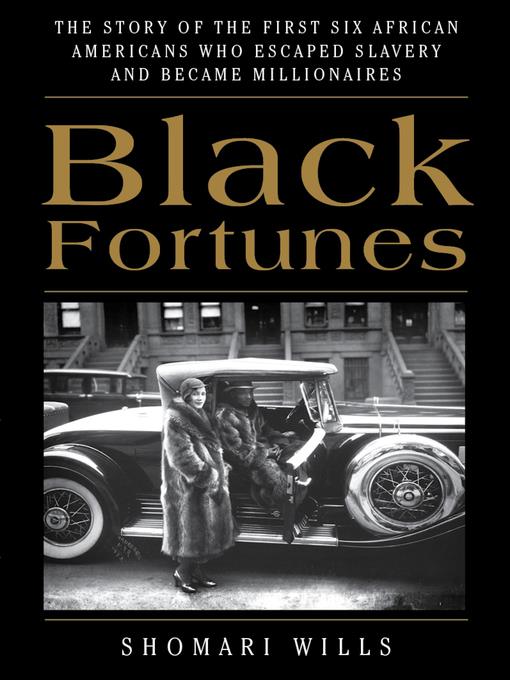
Black Fortunes
The Story of the First Six African Americans Who Escaped Slavery and Became Millionaires
کتاب های مرتبط
- اطلاعات
- نقد و بررسی
- دیدگاه کاربران
نقد و بررسی

September 15, 2017
Based on a University Honors-winning proposal Wills developed at Columbia University's Graduate School of Journalism, this book chronicles the first African American millionaires, from Mary Ellen Pleasant, whose Gold Rush wealth helped abolitionist John Brown, to a Mississippi school teacher who developed an area in Tulsa called "the Black Wall Street." With a 25,000-copy first printing.prepub alertThe first word on titles and trends By Barbara Hoffert
Copyright 2017 Library Journal, LLC Used with permission.

March 5, 2018
Wills, a former contributor to Good Morning America, chronicles the incredible stories of six self-made African-American millionaires who amassed great wealth in the decades after Lincoln’s emancipation proclamation. Hannah Elias (1865–1903) was given land by her millionaire lover and used her money to help African-Americans move into Harlem; schoolteacher O.W. Gurley (1868–1921) developed his land in Oklahoma into an all-black commerce district known as Black Wall Street; and Robert Reed Church (1839–1912) purchased properties in Memphis, which he transformed into the black music enclave that became Memphis’s famed Beale Street. Mary Ellen Pleasant (1814–1904) profited from the Gold Rush and used her wealth to fund abolitionist causes, including John Brown’s Harpers Ferry raid. Annie Minerva Turnbo (1877–1957), a self-taught chemist from Peoria, Illinois, built the first black hair care empire, only to be outdone by her former pupil, Madam C.J. Walker (1867–1919). Willis unearths these figures from obscurity using fluid prose and juicy detail (Elias had a “round face with a flat nose and big brown eyes with heavy eyelids. One of the girls who worked with Elias summed her up this way: ‘she exhibited a peculiar influence over white men’ ”). This highly readable group biography illustrates the ways those early millionaires “survived assassination attempts, lynchings, frivolous lawsuits, and criminal cases” and, in doing so, paved the way for Oprah, Beyoncé, and Jay-Z.

February 1, 2018
The title of journalist Wills' first book might raise expectations for a feel-good story in the rags-to-riches tradition, and, indeed, he explicitly positions his book as a corrective to cultural assumptions about black economic impoverishment by focusing on how once-enslaved African Americans amassed wealth between 1840 and the early 1920s. But their fascinating stories cannot be told without addressing the dire obstacles posed by slavery and white supremacy, making this a history, as well, of the complexity and injustice of American race relations. In this context, Wills argues that the ambitions and achievements of these intrepid individuals were radical acts. Emphasizing the diversity of the black American experience, he recounts the lives of six remarkable men and women from around the country, including chemist and hair-care innovator Annie Turnbo Malone and her megasuccessful employee Madame C. J. Walker, gold-rush millionaire Mary Ellen Pleasant, and Oklahoma teacher-turned-developer O.W. Gurley. Wills' storytelling is infectious, his subjects are irresistible, and his broad coverage invites readers to venture further into the events and historical context he so vividly introduces.(Reprinted with permission of Booklist, copyright 2018, American Library Association.)

























دیدگاه کاربران